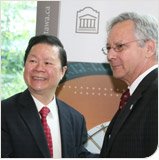"SUMMARY: The judge communicated in private with the opposing counsel during the trial. I want to know what these “ex parte” communications were."
LINK to full Motion Record
This site is devoted to transparency at the University of Ottawa, Ottawa, Canada. UofOWatch exposes institutional behaviour that is not consistent with the public good.
"SUMMARY: The judge communicated in private with the opposing counsel during the trial. I want to know what these “ex parte” communications were."
LR: Our next question is about the Security and Policy Institute.Video by La Rotonde:
Rock: Yes.
LR: So, since the Board of Governors and the Senate were not consulted, we would like to know who approved the program and why there were no consultations?
Rock: Yes. Generally, when we launch a new program, whether it’s in Science, or the Faculty of Arts, or somewhere, we have a consultation and then we also have an analysis and discussions at the level of the Senate and its committees. In this case, we are talking about a program that is non-academic, in the sense that it’s not credited, it’s a program which is offered to people who are implicated in the domain, so that they can perfect their skills, in the professional sense. So, given that it’s not an academic program, we don’t need approval from the Senate and we did not initiate a consultation like we would do with an academic program. The Continuing Education Centre exists in order to give people who are already in the job market a means of improving and perfecting their professional skills — we hire people mostly from outside the university as teachers — so it’s not an academic program as such. We use the framework of the university to offer professional programs, and we also hope to generate additional revenue for the university.
“It’s a service offered by the Centre for Continuing Education. The Centre’s objective is to offer non-credited professional training. Programs are not approved by the Senate because the programs are not academic. It’s not an academic activity in the sense that it would have to have approval of the Senate because a degree is awarded. [The training] is aside from the central mission of the university and it’s a means of generating revenue to help us in our main mission, which is the academic programs. According to us, we don’t need approval from the Senate or Board.”Rock further explained that the upper administration of the university approved the SPI program.
“It’s up to the Working Group to decide exactly what they will recommend. I think it was in 2007-2008 that the university proposed the code of conduct, and it was not well-received. There were inadequate consultations, and all that, but I would rather not prejudge the Working Group’s report. It’s up to them to decide what their judgment is concerning the appropriate steps at present. And I imagine it’s possible that they will recommend a code of conduct, but we will have to wait for the report.Meanwhile, the SFUO has begun organizing to oppose the re-introduction of a student Code, according to a recent article in The Fulcrum.
I think the most appropriate thing for me to do is wait for the Working Group’s report and to not influence their analysis or pre-judge what they will recommend. It’s up to them [the members of the Working Group] to analyze the current situation and come up with their recommendations. And naturally, we will make their report public, and we will have a discussion — we will decide what to do, but it’s not up to me to judge. I will wait for their report.”


